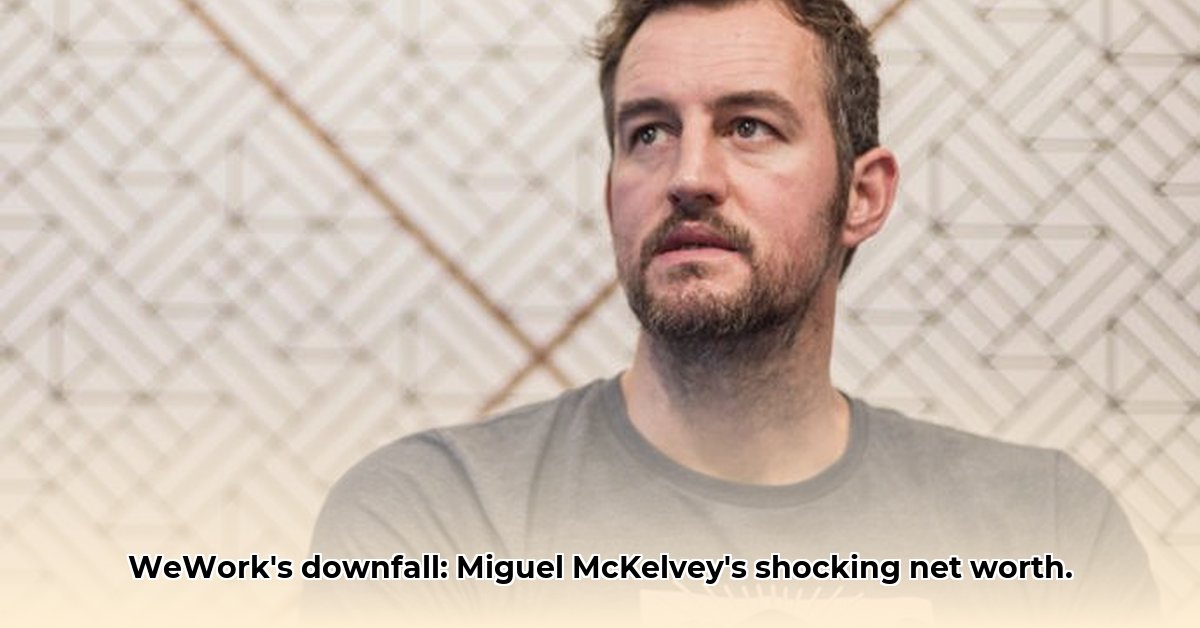
Miguel McKelvey Net Worth: WeWork's Rise and Fall, and What Came After
Miguel McKelvey's story transcends a simple net worth calculation; it's a compelling narrative of ambition, innovation, and resilience in the volatile world of startups. While precisely quantifying his wealth remains elusive – a common challenge with privately held ventures and fluctuating market valuations – his journey from Oregon to co-founding the once-meteoric WeWork offers a fascinating case study. This narrative explores his entrepreneurial journey, highlighting key moments that shaped his career, rather than focusing solely on a continuously changing numerical value. For more on franchise net worths, see this helpful resource.
From Shared Living to Shared Workspaces: The WeWork Genesis
McKelvey's upbringing in Oregon instilled a deep-seated appreciation for community. This emphasis on collaboration and shared experiences profoundly impacted his future endeavors. His early interest wasn't solely financial; he sought to create something innovative and impactful. This foundation, coupled with his design sensibility and business acumen, led to the co-founding of WeWork with Adam Neumann. Their vision – transforming empty buildings into vibrant, collaborative workspaces – resonated perfectly with the evolving work landscape. The concept, deceptively simple, proved revolutionary. By 2016, some reports estimated McKelvey's net worth to be in the billions, but this was largely based on speculative valuations rather than liquid assets.
Did WeWork's rapid expansion directly correlate to McKelvey's personal beliefs about community? The answer lies in examining his design choices. The spaces were more than just offices; they were meticulously crafted environments promoting interaction and creativity, directly reflecting his early focus on shared experiences.
The WeWork Hype Machine: A Spectacular Ascent and a Hard Crash
WeWork’s rise was nothing short of meteoric. Its global expansion, fueled by substantial investment, created hundreds of trendy co-working spaces across multiple continents. The company's energetic culture, often described as vibrant and even chaotic, attracted both employees and investors. However, this rapid growth masked underlying vulnerabilities. The 2019 IPO, far from being a triumphant market entry, turned into a significant setback. Investor concerns about the company's unconventional business model, high burn rate, and governance issues led to a dramatic valuation drop, wiping out billions in paper wealth overnight. The failed IPO and subsequent asset sales, some highly unconventional like a proposed wave pool, highlighted the desperate measures taken to recover from the downturn. How did this experience shape McKelvey’s future business decisions? It undoubtedly emphasized the importance of sustainable growth and rigorous financial planning.
Life After WeWork: A New Chapter
The WeWork collapse didn't signal the end for McKelvey. He demonstrated remarkable adaptability. His experience provided invaluable lessons about rapid growth's challenges. His entrepreneurial spirit led him to new ventures, including his role as a full-time partner at NAYAH in March 2022. Determining his current net worth is difficult; limited public data about his post-WeWork activities makes precise figures speculative. While his wealth is undoubtedly substantial, it's significantly less than the billions attributed to him during WeWork's peak. The specifics remain largely private.
More Than a Number: Lessons from the Ride
Focusing solely on a fluctuating net worth obscures the significance of McKelvey’s journey. It's a powerful story of entrepreneurial success and subsequent setbacks, illustrating the unpredictability of the startup world. His resilience, ability to learn from mistakes, and unwavering entrepreneurial spirit are as valuable as any financial figure. His story serves as a cautionary tale and an inspiration, reminding us that adaptability, innovation, and a clear vision are crucial for long-term success.
How Did Miguel McKelvey's Personal Life Influence His WeWork Decisions?
Key Takeaways:
- McKelvey's architectural background profoundly shaped WeWork's design and aesthetic, contributing significantly to its early success.
- His collaborative style contrasts with Adam Neumann's more flamboyant leadership, influencing their partnership dynamics and WeWork's trajectory.
- Though his net worth remains unclear, his financial gains from WeWork highlight the immense potential – and risks – of high-growth startups.
- His post-WeWork ventures show a shift towards community-focused initiatives, suggesting a personal evolution towards sustainable practices and a less rapid-growth model.
The Architect of Community: McKelvey's Early Influences
McKelvey's architectural background instilled a deep appreciation for design and its impact on community building. This focus on environmental design became the foundation of WeWork's brand identity. His vision wasn't simply to create offices; it was to craft spaces that fostered interaction and innovation. This personal passion proved instrumental in WeWork's early success.
The WeWork Partnership: A Study in Contrasts
The partnership with Adam Neumann presented both advantages and challenges. Neumann’s energetic leadership fueled WeWork's rapid expansion; however, his management style ultimately contributed to the company's downfall. McKelvey's approach was more measured and collaborative. Their contrasting styles directly influenced their roles within the company and its trajectory.
Navigating the Storm: WeWork's Tumultuous End
WeWork's collapse is well-documented. The unsustainable business model and Neumann's leadership contributed to the catastrophic outcome. While McKelvey was impacted by the fallout, his less public-facing role helped shield him from some of the most intense scrutiny. The experience certainly reshaped his perspective on sustainable growth and financial management, informing his future business endeavors.
Beyond WeWork: A New Chapter
McKelvey's post-WeWork activities suggest a shift in priorities. His involvement in initiatives supporting minority-owned businesses points to a greater interest in community-focused endeavors and sustainable impact, marking a personal and professional evolution.